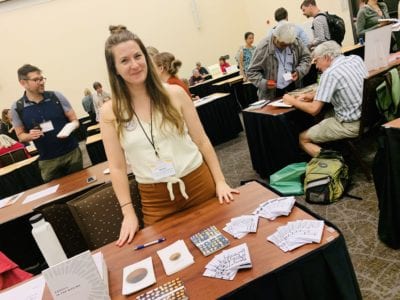For fans of cat colonies, bestiaries, and neighborhood maps, I’ve just released a new hyperlocal mini zine, which catalogs the feral cat community in my neighborhood. If you want a copy, send me a message through my contact form.

By admin in zine Tags: cats, maps, mini zine
For fans of cat colonies, bestiaries, and neighborhood maps, I’ve just released a new hyperlocal mini zine, which catalogs the feral cat community in my neighborhood. If you want a copy, send me a message through my contact form.

By admin in Book Review, Fossils in the Making, literary journals Tags: 2021, carolina quarterly, reviews
A new review of Fossils in the Making written by Tegan Daly appears in the Winter 2021 print version of The Carolina Quarterly. You can also read it online here.
“The final section, “Remains,” ranges back out from the interiority of “Wagers” to a sort of cataloging of conclusions drawn from earlier ideas. The poems of this section vary greatly in structure, but seem to hold a somewhat cohesive voice. There is a resignation to this section. If earlier poems served as the forming of a hypothesis, “Remains” is the dire findings of the research. The section explores the ecological disasters of our own making with an eerie matter-of-factness.“
By admin in Book Review, Diurne, Fossils in the Making Tags: Double Review, Sugar House Review
Dayna Patterson reads Fossils in the Making and Diurne together for Sugar House Review:
“In both Fossils in the Making and Diurne, I’m in awe of Bagdanov’s recursiveness, how lines and phrases from poems echo within individual poems, but also across (and even between) the manuscripts, lending both books an almost dream-making, trance-like quality”
By admin in Book Review, Fossils in the Making
A new review of Fossils by Sarah V. Schweig appears in the May/June issue of American Book Review.
“Fossils often operates in this friction —between poetic truth and post-Enlightenment scientific truth, between intuition and logic, between ideal and brute fact — sparking images, statements, and questions”
If you don’t have access to Project Muse, click here to read the full PDF.
By admin in Book Review, Fossils in the Making
New review of Fossils in the Making up at Dispatches from the Poetry Wars as part of their Poetics for the More Than Human World special issue:
“In her debut poetry collection, Kristin George Bagdanov explores the recursive processes through which beings become something new through creative interactions with other selves, bodies, languages, and worlds. These processes contain echoes of the past, the present, and the future, making fossils a fitting image to guide this collection’s blend of scientific and poetic methods of inquiry, as they are entangled with geologic pasts and our extractive present as well as a future in flux that shifts with our every entanglement with the world we live in.“
–Benjamin Platt
By admin in Book Review, Diurne
Thanks to Cody Stetzel for this new review of DIURNE!
“A spectacular achievement in diary and poetry and mindfulness; this book melds the real, surreal, and unreal in a neat alchemy of the mind. One of the most stark features of this book are the ever-increasing stakes of personal divulgence that several of Bagdanov’s poems end with. Bringing with it a dare, Bagdanov risks a level of investment and engagement for the reader — demanding their complicity in the sheer act of not abusing information provided. I think of this psychological projection in the mode of persona, but instead of personae-as-escape, George Bagdanov provokes the personae-as-infection; destined to give readers a clearer understanding of their own imaginations as opposed to the traditional poetic goal of swinging wide the padlocked doors to an Author’s imagination. Possibility is transfigured toward the reader’s capacity for creation and connection.
Read the rest here.
By admin in Book Review, Books, Fossils in the Making, Uncategorized
New review of Fossils is up at Ecotheo:
the poems function at the height of their powers in a space where direct visceral experience of the page bypasses the barriers of rational exegesis. For all their intellectual demands, ultimately these poems ask you to interact with them deeply as physical, tangible things, as real as a stone trilobite in your hand.
–Dina Strasser
Read the rest here.
Thanks to Poetry Society of America for inviting me to talk about Diurne (Tupelo Press, 2019)! You can read the first poem from the collection and my reflections on its composition here.
In Diurne, I try (and often fail) to develop a method I call “impersonal intimacy,” offering to the reader different types of personal information—credit card #, address, email, as well as family histories, personal insecurities, and confessions to see what might register as expressions of lyric subjectivity and wondering which is the more intimate: my data or my desires. Or how one expresses or suppresses the other.
By admin in articles, Books, conferences
Thanks to Tova Fleming for sitting down and talking about my poetry book and scholarly work! You can read more about our conversation here.

By admin in poems Tags: environment, literary journals
I’m honored to have some new poems in the environmental offshoot of The Brooklyn Rail: The River Rail, which “brings together artists, scientists, and writers concerned with environmental issues and climate change.” Read the whole issue online here.
The issue features field notes on ice cores from a geochemist and paleoclimatologist, incredible art and interviews, as well as some ecological poetry (including mine). You can read my poems “Atomic Shade,” “The Uncene,” and “Chain Reaction” here.
Special shout out to Chris Walker, Denise Bruesewitz, and Kerill O’Neill, the co-editors of The River Rail: Occupy Colby, for inviting me to contribute to this diverse and urgent collection. And gratitude to artistic director and publisher Phong Bui for creating this space and vision.